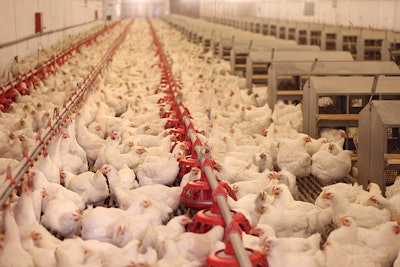
An open letter from the European Parliament is urging food producers to end the sale of caged eggs in international supply chains. (Branex | Dreamstime.com)
European food producing companies using cage eggs in foreign markets have been on the receiving end of some harsh words from the European Parliament, which is calling on them to end the practice.
In an open letter, Members of the European Parliament (MEPs) are urging food producers that have not yet done so, to set a public timeline for ending the sale of caged eggs in their international supply chains.
The later states: “The duty for food companies to behave responsibly toward animals and toward consumers does not end at the border of the continent.”
It continues that, for European companies to use in their supply chains in Asia, the Middle East or elsewhere, practices that are so cruel and unsafe as to be illegal in the EU – and practices that, in many cases, violate the companies’ own stated animal welfare policies – is an abdication of corporate responsibility.
Battery cages have been banned in the EU for close to a decade, with the majority of eggs produced there coming from cage-free or free range system.
However, for those companies that still are failing to source cage-free outside of Europe’s borders MEPs have been particularly critical: “Falling to provide Asian, Middle Eastern, African or Latin American consumers the same level of food safety and food quality provided to European consumers can rightly be viewed as discriminatory”.
The letter has been circulated to non-governmental organizations by the Lever Foundation and Green REV Institute.
In an open letter, Members of the European Parliament (MEPs) are urging food producers that have not yet done so, to set a public timeline for ending the sale of caged eggs in their international supply chains.
The later states: “The duty for food companies to behave responsibly toward animals and toward consumers does not end at the border of the continent.”
It continues that, for European companies to use in their supply chains in Asia, the Middle East or elsewhere, practices that are so cruel and unsafe as to be illegal in the EU – and practices that, in many cases, violate the companies’ own stated animal welfare policies – is an abdication of corporate responsibility.
Battery cages have been banned in the EU for close to a decade, with the majority of eggs produced there coming from cage-free or free range system.
Double standards?
The letter singled out a number of European businesses that have set timelines for ending the use of caged eggs worldwide for praise, along with those European countries where legislation is stricter than that introduced by the EU.However, for those companies that still are failing to source cage-free outside of Europe’s borders MEPs have been particularly critical: “Falling to provide Asian, Middle Eastern, African or Latin American consumers the same level of food safety and food quality provided to European consumers can rightly be viewed as discriminatory”.
The letter has been circulated to non-governmental organizations by the Lever Foundation and Green REV Institute.


















